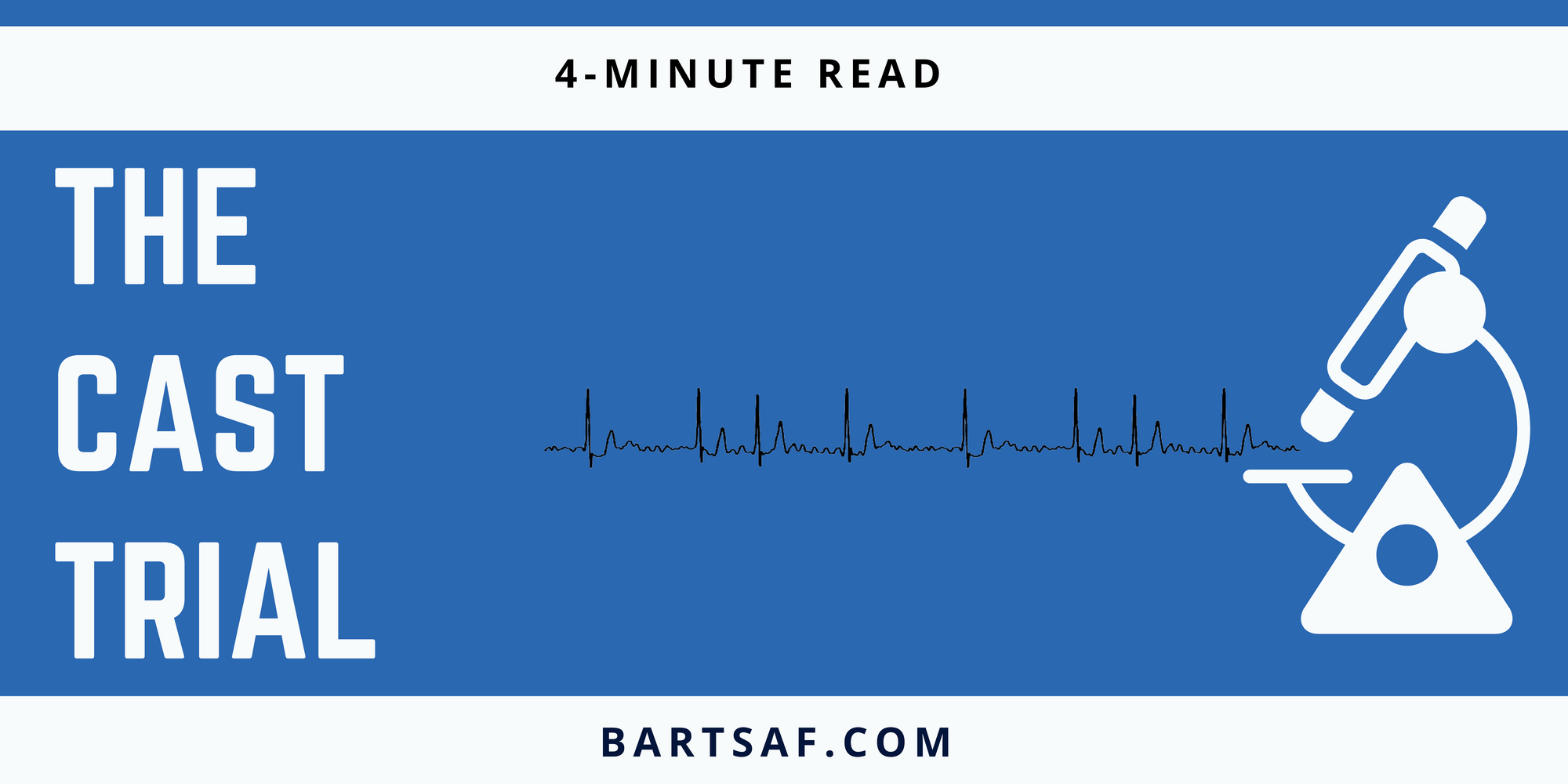The CAST trial
The CAST trial was designed to test whether anti-arrhythmic drugs could reduce the risk of death by suppressing ventricular ectopics in patients after a heart attack.

We need better anti-arrhythmic drugs (drugs that suppress abnormal heart rhythms like AF). One of the reasons why we haven’t had a new drug come to market (despite the large and growing number of patients suffering from heart rhythm problems like AF) is that it is expensive and challenging to do clinical trials when treatments like AF exist and can have such an impact. Although catheter ablation is effective and can dramatically reduce the amount of AF, there will always be patients who are not suitable for it, don’t want it, or don’t respond to it.
A second reason is stigma. In medical school, I only really came across the specifics of anti-arrhythmic drugs in the context of the CAST trial. The Cardiac Arrhythmia Suppression Trial was published in 1991 and was the culmination of an expansive, multi-centre study across America. It was designed to test whether anti-arrhythmic drugs could reduce the risk of death by suppressing ventricular ectopics (the extra heartbeats coming from the bottom chambers of the heart) in patients after a heart attack. So, they were not studying AF but the drugs they were studying were the ones often used for AF such as flecainide.
The rationale was that ventricular ectopics could be the trigger of fatal sustained heart rhythm problems seen in patients after a heart attack and so stopping the trigger with drugs might reduce the risk of sudden death.
The anti-arrhythmic drugs did reduce the number of ventricular ectopics but (and it’s a very big but) there was an increase in the number of sudden deaths in the drug arm compared to the placebo arm (5.7% vs. 2.2%). This result was so shocking, the trial was stopped early and patients were taken off the anti-arrhythmic drugs.
Now several caveats that you must note:
- The CAST trials enrolled patients with recent heart attacks, had a high ventricular ectopic burden and had weak hearts. In the 1980s, heart attack management was very different- there were no stents, emergency heart attack centres, or advanced blood thinners and so the outlook was much worse than it is today. This paradoxical increase in arrhythmias and death has not been shown in patients who have structurally normal hearts.
- Only specific types of anti-arrhythmic drugs were used: flecainide, encainide, and moricizine (I’ve never seen the latter two prescribed in the UK). Their mechanism of action is very different from other anti-arrhythmic drugs like sotalol or amiodarone and so don’t generalise these results to all antiarrhythmics. Amiodarone has been well studied and has not shown any such effect in these groups of patients
- Ventricular arrhythmias are not the same as atrial fibrillation. The mechanisms are different and the risks associated with them are different too.
Nevertheless, the CAST trial had a rippling effect; with guidelines and physicians wishing to err on the side of caution. Class 1c anti-arrhythmic drugs (the type of drug that flecainide is) were not recommended for patients with coronary artery disease or a weakened heart muscle and this still stands. If you have AF, your cardiologist should ask you about previous heart attacks, and whether you have any angina symptoms and will do an echo scan to check your heart is not weak. In this circumstance, flecainide can be very effective, with some patients experiencing significant improvement in their symptoms.
Generalisations can be harmful in medicine
So, what’s the lesson here? It comes back to an important theme of 21st-century medicine and that is personalisation. Generalisations can be harmful in medicine and in this case, writing off a drug in all patient groups may not be necessary if the evidence doesn’t support that. However, the converse is also true in that it is important to ask your doctor if any previous diagnosis or drug means you should be excluded from taking a ‘standard’ drug.
Personalise your therapy and that can only happen if you know your data!
Cardiac Arrhythmia Suppression Trial (CAST) Investigators. Preliminary report: effect of encainide and flecainide on mortality in a randomized trial of arrhythmia suppression after myocardial infarction. N Engl J Med. 1989 Aug 10;321(6):406-12. doi: 10.1056/NEJM198908103210629. PMID: 2473403.
